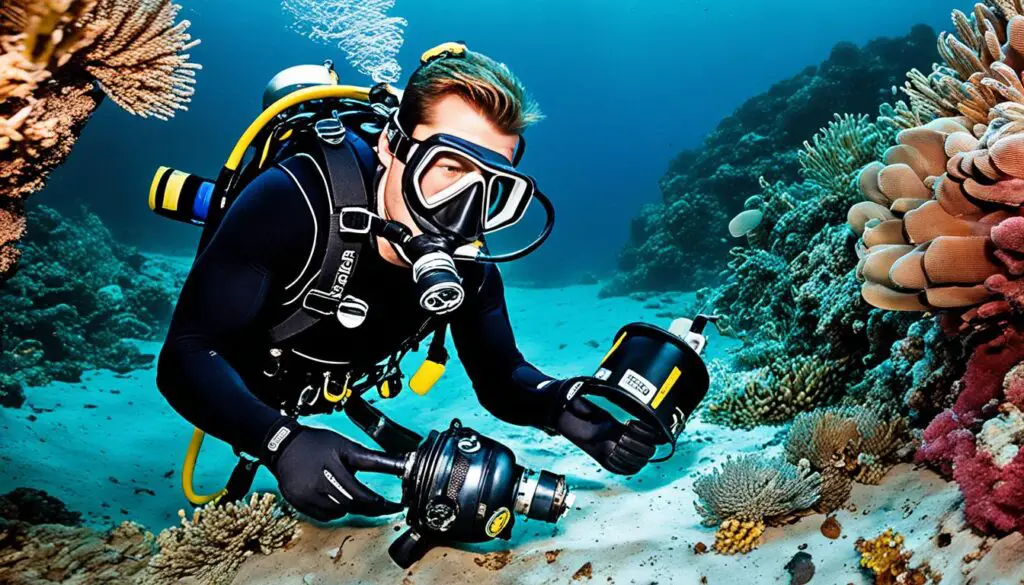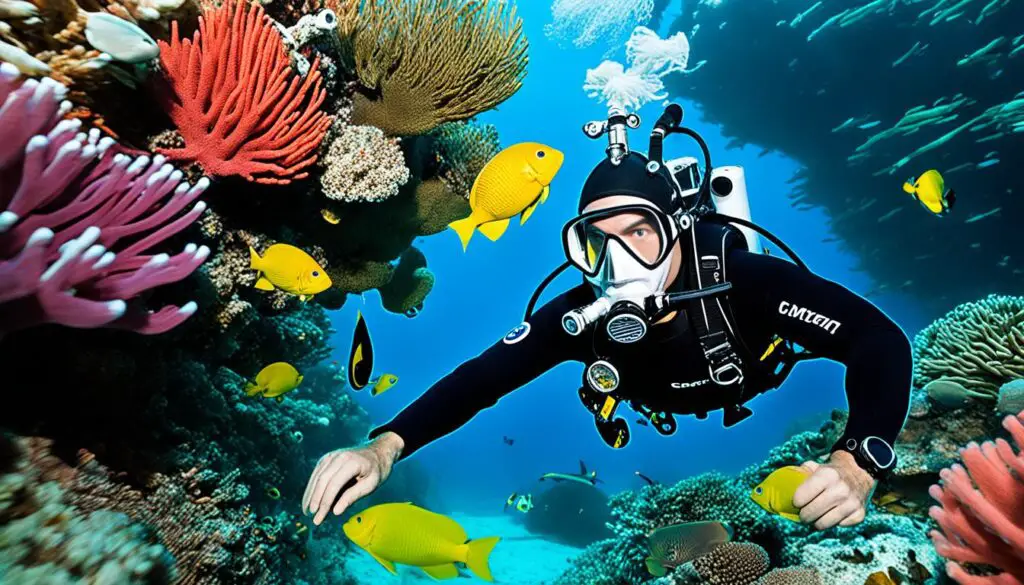Scuba diving and freediving open the door to a magical, underwater world. For both new and old divers, safety is key to fun times below the surface. Check out these essential safety tips:
Getting certified by a respected diving school and professional is the first step. This ensures you have the skills and knowledge to tackle any diving challenge. Always remember, top-notch training is non-negotiable.
It’s safer and more fun to dive with a buddy or a group. Having someone by your side means help is close by if needed. Plus, you get to share in the thrill of exploring together.
Before diving, plan out your adventure carefully. Think about dive depth, how long you’ll be down, and any dangers. Planning ahead helps lower risks and keeps you safe while diving.
Check your diving gear thoroughly before each dive. Make sure everything works correctly, from your mask to your BCD. A well-maintained gear set decreases the odds of problems underwater.
Watch your air use as you dive. Being aware of how much air you have left is crucial. Staying within your capabilities and comfort level leads to a happier and safer dive.
Equalizing your ears and slowing your ascent keeps pressure from building up. Going up slowly, at the right speed, and making safety stops are key. Doing this prevents ear pain and avoids serious injuries, like the bends.
Control your buoyancy and weight carefully. This keeps you from sinking too fast or rising too quickly. Plus, it saves the ocean life by preventing damage to coral reefs.
Never forget about dive insurance. Even the pros can run into trouble, and having coverage means you won’t worry about costs if something happens. It offers a layer of protection for unexpected situations.
Remember these safety tips, and you’ll be ready for your next dive adventure. Keep safe, have fun, and explore the incredible beauty beneath the waves.
Key Takeaways:
- Acquire certification from a reputable training agency and instructor.
- Dive with a buddy or in a group for enhanced safety.
- Create a detailed dive plan considering depth, duration, and hazards.
- Perform thorough equipment checks before every dive.
- Monitor your air consumption throughout the dive and stay within your comfort zone.
Get Certified and Dive with a Buddy
Diving is fun, but it needs to be safe. To be safe, getting the right certifications is key. You need to learn from trusted sources and skilled teachers. They will give you what you need for a safe dive.
Being certified makes diving more fun. You’re trained well to deal with any challenges. You’ll feel confident and ready to explore the underwater world.
Diving with a buddy is important for safety. They help watch your back and share cool moments. Together, the dive becomes safer and more fun.
It’s even more fun when you dive with someone. You can talk, point at cool fish, and have an amazing time together. Diving with a buddy makes the whole experience better.
For freediving, remember the “one up, one down” rule. This ensures safety. It means one person is always ready to help, making your dives safer.
Remember, diving with a buddy is not just about safety; it’s about creating lasting memories and sharing the underwater wonders together.
Let’s check out some interesting stats on diving together:
| Statistic | Scuba Diving Certifications | Freediving Certifications |
|---|---|---|
| Number of Certified Divers Worldwide | 1.7 million | 450,000 |
| Percentage of Diving Accidents Involving Certified Divers | 89% | 67% |
| Percentage of Diving Accidents Involving Solo Diving | 58% | 42% |
| Percentage of Diving Accidents Involving Buddy Diving | 12% | 31% |
Certifications and diving with a buddy are crucial. While many accidents involve certified divers, the risk drops with a buddy. This shows how important it is to dive with someone.
The Benefits of Certified Diving and Buddy Diving
- Enhanced safety through mutual support and assistance
- Shared experiences and memories with a fellow diver
- Improved dive planning and risk management
- Increased confidence and peace of mind
- Ability to explore more challenging dive sites
- Opportunity to learn from each other’s skills and experiences
Being certified and diving with a buddy is about more than safety. It makes your dive experience better. So, remember to get certified and find a buddy to dive with. Enjoy the magic of the underwater world safely.
Plan Your Dive and Conduct Pre-Dive Checks
Creating a good dive plan is key for a successful underwater trip. Think about how deep you’ll go, how long the dive will be, and where you’ll get in and out. Also, watch out for dangers. With a solid plan, you cut down on risks and make diving more enjoyable.
Checking your gear before a dive is very important. Make sure all your equipment works well. Look at your air supply, your dive computer, your BCD, and your regulator. This step helps you avoid problems in the water.
Equipment Checks
When checking your gear, every little detail counts. Look for damage or leaks in your tanks. Your regulator should be clean and working smoothly. Your BCD must fill and empty correctly. And your dive computer should show the right information.
Freedivers’ Pre-Dive Checks
Freedivers should also do careful checks. Check your buoy and ropes to ensure they’re safe to use. Make sure your weight system is right for controlling how you float. Ensure your set-up is perfect for a safe and fun dive.
Always remember the importance of planning and checking your gear. Being prepared lets you enjoy the dive more. You can dive with peace of mind, knowing you’ve done everything you need to.

| Dive Planning Checklist | Pre-Dive Equipment Checks |
|---|---|
|
|
Essential Dive Safety Practices
When you scuba dive or freedive, always put safety first. By sticking to these dive safety steps, you make sure your time underwater is both safe and fun.
Monitor Your Air Supply
Watching how much air you have left is key. Make sure you always have enough air to go up. This keeps you safe and away from the danger of not having air during the dive.
Equalize Your Ears
It’s important to equalize your ears to avoid discomfort and harm as you go deeper. Learn the Valsalva or Frenzel maneuver to make the pressure in your ears the same as the water around you. But, never try to force your ears to adjust, as it can cause problems.
Ascend Safely
Going up slowly is vital to avoid getting decompression sickness. Always keep an eye on how fast you’re going up. Stop for safety as you need to. Rising too quickly can cause bubbles in your body that harm you. So, go up slowly and give your body time to adjust smoothly.
Stay Within Your Limits
Dive within what you know and can do. Pushing yourself too far can lead to accidents. Understand what you’re capable of. This makes your diving adventure safer and more fun.
Don’t forget, diving safely is always the most important thing. Follow these safety tips to lower the risks and enjoy exploring under the sea.

| Safety Practice | Description |
|---|---|
| Monitor Air Supply | Keep track of your air consumption throughout the dive and ascend with a sufficient reserve of air. |
| Equalize Ears | Practice proper equalization techniques to alleviate pressure as you descend and avoid forcing equalization. |
| Ascend Safely | Ascend at a controlled pace, following recommended ascent rates, and make safety stops as required. |
| Stay Within Your Limits | Dive within your training, experience, and comfort level, and dive with an awareness of your limits. |
Conclusion
Safety is the top priority in diving, both scuba and freediving. Following essential safety tips can reduce risks, making your underwater adventures safe and memorable. Make sure you’re certified, never dive alone, and always plan your dives.
Perform pre-dive checks, keep an eye on your air, and remember to equalize your ears. To end your dives safely, stay within your limits and have insurance. All these steps make diving safer and more fun for everyone.
FAQ
Why is it important to get certified for diving?
Certification from a trusted agency and instructor is key. It helps divers gain the skills needed for safe underwater journeys.
Why should I always dive with a buddy?
Diving with a buddy raises your safety. It’s good to have someone there in case of emergencies.
What factors should I consider while planning a dive?
Think about the dive depth, time, and where you’ll enter and exit. Also, consider any potential dangers to stay safe and enjoy your dive.
How important are pre-dive checks?
Checking your gear before each dive is crucial. It ensures everything will work right, reducing the chance of problems below the surface.
How should I monitor my air supply during a dive?
Always track how much air you use. Make sure you have enough air left to be safe as you return to the surface.
What should I do to equalize my ears while descending?
To avoid ear pain, equalize gently as you go deeper. Never push too hard or risk hurting your ears.
How should I ascend safely from a dive?
Ascend slowly, at the pace recommended. Take safety stops as advised to avoid decompression sickness.
How can I ensure proper buoyancy control underwater?
Get good at controlling your buoyancy and make sure your weight is right. This prevents you from sinking too fast or shooting up, keeping you steady under the water.
What are the limits I should consider while diving?
Stay within what you’ve been trained for and what you know you can handle. Being aware of your limits helps keep diving safe.
Is dive insurance coverage necessary?
Dive insurance is important for emergency financial protection. It gives divers peace of mind, knowing they are covered.
Why is it important to follow dive safety guidelines?
Observing dive safety tips keeps you secure and ensures a great dive. It also helps protect our aquatic world for everyone to enjoy.
